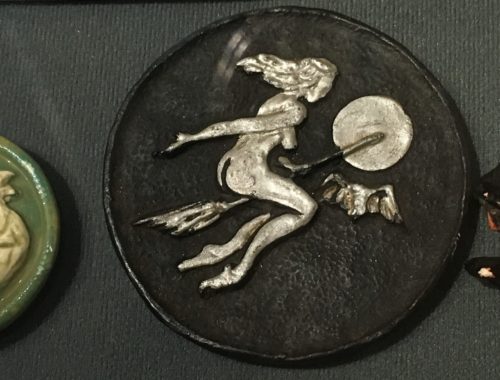What’s in a Name?
What’s a magical name? How do I get one? And why are so many Wiccans named Raven?
A magical name—or craft name, as they are sometimes called—is a name you take on when you become a Wiccan, and it’s the name other Wiccans in the community will know you by and that you will use in Wiccan rituals. Some people take on a name when they first become interested in Wicca. Others wait until they dedicate themselves to the path through a self-dedication ceremony or when they are initiated into a particular Wiccan group. Some Wiccan traditions (traditions are kind of like denominations in Christianity) have special rules for when someone takes a name and what kind of name it can be, and others don’t. And in some cases your name might be bestowed on you by a teacher, but this practice is not very common anymore.
Most Wiccans who have magical names only use them in the Wiccan community, and use their legal names elsewhere. Having a second name can help protect your privacy in case there are people you don’t want to know about your Wiccan practice. However some Wiccans use their magical names all the time, even outside of the Wiccan community, and some only use theirs when they are in ritual space.
How Do I Choose a Name?
Your magical name should represent something that applies to or describes you, something you aspire to be, or something that’s very meaningful to you. Some Wiccans choose names out of literature or mythology. For example, I have a friend who chose the name Cian from the Cath Maige Tuired saga from Celtic mythology. Others choose nature-oriented names, such as the name of a favorite tree or healing herb. Still others choose family names; I have a friend who uses his deceased grandfather’s first name in honor of that relationship. Some possibilities are names of stars, planets, elements, animals, stones, or colors; mythological beasts; names that reflect a craft or trade; names related to music or art—the sky is the limit (and yes, I know one or two Wiccans named Sky). The most important things are that your magical name should be meaningful to you and that it should be something you’re willing to use in front of the gods in sacred space.
Some Things to Consider
The name you choose should also be something you like enough to use for a long time and can either grow into or that will still work for you when you’re further down your path. You can take a different magical name later if you’ve outgrown the old one, but it’s hard to re-train your friends to use the new name, so it’s best to think ahead and pick one you can use for a long time.
It’s okay to take the name of a deity—such as Athena, Lugh, Inanna, or Osiris—but if you’re thinking of doing that, make sure you’ve done your research, you know a lot about that deity, and you have some sort of relationship with him or her. It would be disrespectful to take on the name of a deity you know very little about. Consider doing a ritual in honor of the deity and asking permission through pathworking or meditation before taking on the name.
You may also want to try to pick a name that’s not common in the community. Since there are more Wiccans these days than ever, this can be a challenge. The reason there are so many Ravens, for example, is that Raven a cool name, and is associated with power, wisdom, and several Celtic and Norse deities. If you have other Wiccans or Pagans in your area, it’s polite to avoid taking one of their names (and it’s a lot less confusing, too). A Google search can give you a good idea of what names are common. But if the name that really works for you is a common one, don’t let that stop you.
Last but not least, try to pick something that’s not pretentious, especially if you are a beginner. Sometimes Wiccan high priests and high priestesses are referred to as “Lord” and “Lady” respectively. Do not use these honorifics if you aren’t part of a tradition that uses them and/or you haven’t earned them. And there are few things in the Wiccan community that cause more eye-rolling than a new practitioner who asks to be called a name that would be better in a live-action role-playing game or Renaissance faire. (See also my post on wearing hood-ornament-sized pentacles.) It’s completely fine if you want to be Lord Dragonsbane in World of Warcraft, but it’s only going to get you snickers in the Wiccan community.
Questions to Help You Choose
Here are some questions to spark your creativity in thinking of a magical name.
- Do you have a favorite myth or set of myths? Is there a character or deity in those stories who appeals to you, or whose qualities you’d like to embody?
- Is there anything in the natural world you have a particular affinity for, or whose characteristics you have or would like to have? Examples are:
- Animals (mammals, fish, birds)
- Herbs (for healing, incense, or those with magical properties)
- Flowers and trees
- Stones (tourmaline, lapis, tiger eye, etc.)
- Elements (earth, air, water, fire)
- Weather (wind, rain, sun)
- Celestial bodies (moon, sun, stars)
- Is there a particular trait or talent you have or that you’d like to enhance? Is there a word related to this talent that you can use? Is there a deity associated with this talent whose name you could use? (For example, Bridgid is a goddess of the forge, and Apollo is a god of music.)
- Is there a name from astrology, runes, or tarot that might work for you? How about high magic or the Kabbalah?
- Is there a particular historical figure, musician, or artist you identify with?
- Is there someone from your ancestry whose name you might like to use? Or is there another name you might like that would reflect and honor your ancestry?
What If I Don’t Want a Magical Name?
When I was initiated, I didn’t want to take a magical name. I felt that if I couldn’t walk before the gods as myself, what was the point? However it was a requirement, so I put it off until the last minute and chose it literally five minutes before I was initiated. I wouldn’t recommend this process, but I chose a good name in spite of myself. I use it only in ritual, though, because it’s a special name for special circumstances. When I use that name, I am in sacred space, and it has become a positive trigger for me. Most traditions don’t require you to take a name, and you certainly don’t have to take one if you are a solitary practitioner. Do what feels right to you. If you want to practice using your legal name, so mote it be.




